|
|
|
Sort Order |
|
|
|
Items / Page
|
|
|
|
|
|
|
| Srl | Item |
| 1 |
ID:
147721
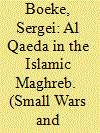

|
|
|
|
|
| Summary/Abstract |
After incurring significant losses during France’s 2013 Operation Serval in Mali, Al Qaeda in the Islamic Maghreb (AQIM) is back. Mokhtar Belmokhtar has rejoined the group, violent attacks are on the increase, and southern Libya offers elements of the group a new safe-haven. This article takes a long view on AQIM, looking at its objectives and ideology, organizational structure, relationship with the local population and revenue model to determine whether they should be labelled as terrorists, insurgents, or ordinary criminals. The article concludes that AQIM generally follows a strategy of terrorism, while some elements and modus operandi could also be indicative of a strategy of insurgency. AQIM’s primary commanders have a long-standing relationship with the global Al Qaeda movement, are unlikely to be seduced by the Islamic State, and enjoy significant autonomy in conducting their operations. There is, however, little evidence that supports the view that AQIM is a criminal organization behind a religious façade, and its Salafi–jihadist ideology remains a leading determinant.
|
|
|
|
|
|
|
|
|
|
|
|
|
|
|
|
| 2 |
ID:
172871
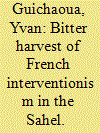

|
|
|
|
|
| Summary/Abstract |
This article studies the bitter diplomatic sequence arising in the fall of 2019 between France and the Sahelian countries where France has been conducting military operations since 2013. Far from being just one more hiccup in the troubled relations between France and its former colonies, the article interprets this sequence as a constitutive effect of French protracted military presence in the Sahel. Specifically, it argues that although France has a rather clear security-driven agenda, its operational moves produced by bureaucratic thinking are questioned by influential sections of Sahelian public opinions who frame the French military presence as a deeply political issue over their country's sovereignty. In addition, being the de facto military guarantor of the security of Sahelian regimes, France constrains the domestic political conversation through the ‘red lines’ it imposes on actors. This externally-induced distortion of the domestic political landscape eventually places Sahelian authorities in front of a dilemma. Pleasing their foreign patrons might cost them the support of the section of public opinion most attached to national sovereignty, and expose them to nationalist entrepreneurs.
|
|
|
|
|
|
|
|
|
|
|
|
|
|
|
|
| 3 |
ID:
183464
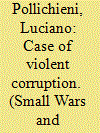

|
|
|
|
|
| Summary/Abstract |
This article provides a new perspective on the logic of violence of the JNIM in the context of the Malian civil war. After a critical review of the literature on the Malian conflict, this article will apply Benjamin Lessing’s model on the logic of violence in criminal wars to JNIM. Through the adoption of Lessing’s model, this article will demonstrate how JNIM’s insurgency can be considered as a case of violent corruption in the context of a war of constraint. Combining qualitative and quantitative methods, this paper will show firstly, how the Malian civil war should be conceived as a war of constraint rather than a war of conquest; secondly, how JNIM is using violence in order to restrict the implementation of the rule of law in some regions which are strategic also for its financing activities. By adopting this new framework, it will be possible to overcome some conundrums characterising the debate on the Malian insurgency and to highlight some relevant topics for future research.
|
|
|
|
|
|
|
|
|
|
|
|
|
|
|
|
| 4 |
ID:
185760


|
|
|
|
|
| Summary/Abstract |
On April 20, 2021, as he was preparing to commence his sixth term in office, it was officially announced that Chadian President Idriss Déby Itno had died on the battlefield. He was immediately and unconstitutionally replaced by his son, General Mahamat Idriss Déby, at the head of a fourteen-strong transitional military council, to great international acclaim. This contribution attempts to spell out what this series of events and Déby’s career can tell us about current Chadian politics and the nature of the Chadian state more generally.
|
|
|
|
|
|
|
|
|
|
|
|
|
|
|
|
| 5 |
ID:
191575
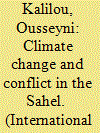

|
|
|
|
|
| Summary/Abstract |
Environmental stress contributes to food insecurity, poverty, forced migration and violent conflict in the Sahel, with climate change aggravating the situation. The production of gum arabic from the acacia tree increasingly aligns with the community stakeholders’ efforts to promote climate change mitigation, adaptation and resilience. Based on expert interviews and field observations in Niger, and a reading of relevant documents, I found that gum arabic production is valuable for conflict mitigation because it helps tackle the root causes of violent conflicts. The acacia gum tree is a natural soil fixer and multinational companies have coveted the resin from the tree, which is a rising commodity and a promising source of revenue for the local inhabitants. As different communities work together and cooperate with outside actors (government agencies, international partners, NGOs and businesses), the opportunities to build social cohesion around the tree increase. By facilitating ecological improvement, social inclusion and poverty alleviation, the promotion of gum arabic production, despite other issues such as bad natural resource governance, is a critical environmental peacebuilding strategy. Hence, suitable funding of massive afforestation with the acacia tree fits with community-based natural climate solutions to global humanitarian issues by protecting and restoring the local environment.
|
|
|
|
|
|
|
|
|
|
|
|
|
|
|
|
| 6 |
ID:
179280
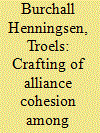

|
|
|
|
|
| Summary/Abstract |
In spite of several international interventions to contain and degrade militant groups in the Sahel region, al-Qaeda affiliated groups have managed to retain their alliance and even spread and intensify their use of violence. This article explains the cohesion of the insurgency alliance as the outcome of a number of sound strategic decisions. By applying a framework of irregular strategy, the article examines the processes of early adaption to pre-existing social networks and the subsequent shaping through political, violent, and communicative lines of effort. Although the primary purpose of the strategy was not alliance cohesion, the result is that al-Qaeda related networks cooperate across ethnic and social cleavages, despite the many setbacks and dilemmas that local politics generate. The article adds an agency-oriented perspective to the growing literature on insurgency fragmentation and cohesion, which are major factors in the outcome of civil wars.
|
|
|
|
|
|
|
|
|
|
|
|
|
|
|
|
| 7 |
ID:
172869
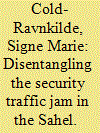

|
|
|
|
|
| Summary/Abstract |
Despite years of ongoing interventions by multiple external and regional actors, the security situation in west Africa's Sahel region is dramatically deteriorating. In this introduction to the special section of the July 2020 issue of International Affairs, we zoom in on four major external international intervention actors (France, the United States, the European Union and the United Nations) in the Sahel region's escalating ‘security traffic jam’. We argue that the diversity of intervention actors makes the Sahel a paradigmatic case for exploring a set of often-overlooked constitutive intervention effects. By adding new temporal, relational and spatial dimensions to the notion of ‘constitutive effects’ as introduced by post-structuralists in the 1990s, we (re)launch constitutive effects as a conceptual framework for approaching the study of ongoing intervention engagements. From this perspective, and as further illustrated in this special section, intervention continuity and escalation cannot be explained simply with reference to frameworks of ‘success’ or ‘failure’, but require a broader conceptualization of effects, including how specific threat perceptions, rationales and problematizations get constituted and consolidated through and during ongoing intervention practice. Contributions to this special section each unpack a diverse set of constitutive effects including the contested performance of security actorness, the (un)making of security alliances and partnerships, logics of choices produced by ongoing intervention practices, as well as the constitution of conditions for continual international involvement.
|
|
|
|
|
|
|
|
|
|
|
|
|
|
|
|
| 8 |
ID:
110808
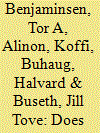

|
|
|
|
|
| Publication |
2012.
|
| Summary/Abstract |
While climate change scenarios for the Sahel vary and are uncertain, the most popularized prediction says there will progressively be drier conditions with more erratic rainfall. According to some, an increase in violent conflicts over scarce resources should also be expected. This article investigates the climate-conflict nexus in detail, focusing on a distinct area at the heart of the Sahel, the inland delta of the Niger river in the Mopti region of Mali. Two complementary analytical approaches are applied. The first consists of collection and analysis of court data on land-use conflicts, 1992-2009, from the regional Court of Appeal in Mopti. A comparison of the conflict data with statistics on contemporaneous climatic conditions gives little substance to claims that climate variability is an important driver of these conflicts. Second, we carried out a qualitative analysis of one of the many land-use conflicts in the region. Again, we find that factors other than those directly related to environmental conditions and resource scarcity dominate as plausible explanations of the violent conflict. We argue that three structural factors are the main drivers behind these conflicts: agricultural encroachment that obstructed the mobility of herders and livestock, opportunistic behavior of rural actors as a consequence of an increasing political vacuum, and corruption and rent seeking among government officials.
|
|
|
|
|
|
|
|
|
|
|
|
|
|
|
|
| 9 |
ID:
092557
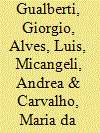

|
|
|
|
|
| Publication |
2009.
|
| Summary/Abstract |
This paper examines the process of privatization of electrical utilities for the country members of CILLS (Burkina Faso, Cape Verde, The Gambia, Guinea-Bissau, Mali, Mauritania, Niger, Chad and Senegal).
These Sahelian countries, the majority of whom rank at the bottom positions of the HDI and present extremely low access rates to modern energy services, together started a process of energy sector reform and energy utility privatization in the 1990s. The reforms, endorsed by the International Financial Institutions, focused on the privatization of the electrical utilities, and encountered many difficulties. The objective of this article is to analyze what happened in each of these nine countries and to understand the reasons that led to a general halt or reversal of the process.
The analysis is first introduced by a brief examination of regional energy situations and of the international context in which the reforms took place; this includes the policy guidelines introduced by the IFIs and the investment decisions of energy corporations. We analyze management processes and ownership changes for each country. Finally, the article identifies the problems encountered as a result of reform design and the interaction of behaviors between the governments, the International Corporations and the IFIs; lastly, we draw conclusions.
|
|
|
|
|
|
|
|
|
|
|
|
|
|
|
|
| 10 |
ID:
174525
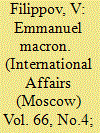

|
|
|
|
|
| Summary/Abstract |
IN AFRICA, France is guided by its economic interests and, to a certain extent, political considerations rooted in traditions, social relationships, issues of French influence, and its national pride. From the first days of his presidency, Emmanuel Macron, the eighth president of the Fifth Republic, has been talking about changing his country's African policy to a "soft power" of sorts. Nobody, neither the Élysée Palace, nor capitals of Francophone African countries nor other external actors with interests of their own on the continent have so far answered whether this can be done at all.
|
|
|
|
|
|
|
|
|
|
|
|
|
|
|
|
| 11 |
ID:
184060
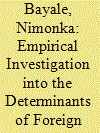

|
|
|
|
|
| Summary/Abstract |
This paper introduces model uncertainty into the empirical study on the determinants of foreign aid at the regional level. This is done by adopting a panel Bayesian model averaging approach applied on the data of 10 Sahel countries spanning from 1985 to 2017. Our results suggest that, among the regressors considered, those reflecting trade stakes including arm imports, institutional conditions and socioeconomic prospects tend to receive high posterior inclusion probabilities. These findings are robust to changes in the model specification and sample composition and are not meaningfully affected by the linear panel data model applied. The results highlight three concerns that justify aid flows towards Sahel countries: (i) interest of donors (self-interest), (ii) recipient economic needs and (iii) security purposes. The paper recommends Sahel countries to strengthen international cooperation for security and peace in compliance with the 13th goal of the Agenda 2063 of the African Union.
|
|
|
|
|
|
|
|
|
|
|
|
|
|
|
|
| 12 |
ID:
185517
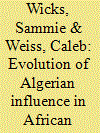

|
|
|
|
|
| Summary/Abstract |
Algerian leadership was once instrumental in organising and fomenting jihad in North Africa and the Sahel. Alongside leadership decapitations, counter-terrorism crackdowns, and a ‘Sahelian shift’ following the influx of Sahelian members, Algerian influence has since significantly waned. Today, Algerian influence is mainly seen in cautionary tales against extremism and infighting. In contrast, few Algerian jihadists still play a role within the overall hierarchy of al-Qaeda's North African and Sahelian branches. As such, it is ultimately a new generation – a non-Algerian generation – that is leading the jihadist charge in northern Africa and the Sahel. However, although diminished, Algerian leadership remains persistently valuable to al-Qaeda’s senior leadership due to their strategic utilitarian view.
|
|
|
|
|
|
|
|
|
|
|
|
|
|
|
|
| 13 |
ID:
178522
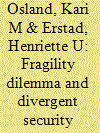

|
|
|
|
|
| Summary/Abstract |
Despite an exponential increase in international resources devoted to the Sahel, the situation on the ground continues to deteriorate. This is largely due to the so-called “fragility dilemma”, faced by fragile states that are in critical need of external assistance, but have limited absorption capacity and are governed by sitting regimes that dictate the terms and upon which external actors must rely. This dilemma has contributed to an increasing divergence between a state-centric regional and a people-centric transnational security complex. In particular, a heavy-handed approach to violent extremism and external policies aimed at curbing irregular migration have had a number of unintended consequences, disrupting livelihoods and further exacerbating instability in the Sahelian states.
|
|
|
|
|
|
|
|
|
|
|
|
|
|
|
|
| 14 |
ID:
171707
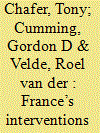

|
|
|
|
|
| Summary/Abstract |
France’s interventions in Mali and the wider Sahel appear to mark a new departure in French military policy in terms of the approach to multilateralism adopted, the regionalisation of the response, and the levels of violence deployed. Yet how ‘new’ is this approach, when set against the historical backdrop of French military interventions in Africa? Should it be seen as a modified version – an adaptation – of the new type of multilateral engagement that emerged in the wake of the 1994 Rwandan genocide? Using a historical institutionalist lens, employing the notions of critical junctures, ‘layering’, and ‘drift’, this article briefly sets out the unilateral approach that marked French military policy in Africa prior to 1994 before going on to analyse the multilateral approach and associated path-dependent practices that emerged after the Rwandan genocide. Drawing on elite interviews in Europe, the US and Africa, the article shows that, while France’s engagement in the Sahel is characterised by an ostensibly novel multilateral approach, it does in fact combine new and old norms, ideas and practices.
|
|
|
|
|
|
|
|
|
|
|
|
|
|
|
|
| 15 |
ID:
172172
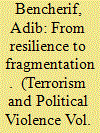

|
|
|
|
|
| Summary/Abstract |
During the last decade, Al Qaeda in the Islamic Maghreb (AQIM) managed to survive despite suffering four major fragmentations. Through the case study of AQIM, the goal of this paper is to contribute theoretically and empirically to the literature on terrorism by explaining the fragmentation of resilient jihadist groups. Two causes of fragmentation are identified: the “preference divergence,” in reference to the works of Shapiro, and the structural organization of power. Furthermore, two notions are presented to refine the theoretical tools of the literature on terrorism: a) the meta-strategy of survival, and b) centralized and deconcentrated power. To explore the group’s history and demonstrate the modularity of AQIM, a triangulation of primary sources, such as internal documents and key interviews, along with the monitoring of the regional press, is utilized. The author concludes this paper by suggesting new avenues for studying the evolution of jihadist groups.
|
|
|
|
|
|
|
|
|
|
|
|
|
|
|
|
| 16 |
ID:
175716
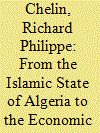

|
|
|
|
|
| Summary/Abstract |
Al Qaeda in the Islamic Maghreb (AQIM) appeared on the Algerian landscape in 2007 after the merger between Al Qaeda and the GSPC, with the objective of expanding its existing network in North Africa and the Sahel region. Pressure from security forces in Algeria propelled the group to seek refuge in Mali, where the 2012 conflict provided a safe haven for the group. Opération Serval, launched by the French military in 2013, dealt a severe setback to AQIM, as many of its fighters were killed and others dispersed to other parts of the region. From that period onwards, there has been a reduction in terror attacks and bombings until recently. Yet, an increase in kidnapping of foreigners for ransom coupled with drug trafficking signalled a transformation in the modus operandi of the group. To understand this trend, the article applies the crime-terror paradigm in order to assess the evolution of AQIM from a terror group with political and religious intentions into a group engaged in criminal activities with economic motivations. The article finds that AQIM is a hybrid entity that displays both terrorist and criminal motivations which are determined by the context within which the group finds itself.
|
|
|
|
|
|
|
|
|
|
|
|
|
|
|
|
| 17 |
ID:
178521
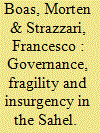

|
|
|
|
|
| Summary/Abstract |
Once a region that rarely featured in debates about global security, the Sahel has become increasingly topical as it confronts the international community with intertwined challenges related to climate variability, poverty, food insecurity, population displacement, transnational crime, contested statehood and jihadist insurgencies. This Special Issue discerns the contours of political orders in the making. After situating the Sahel region in time and space, we focus on the trajectory of regional security dynamics over the past decade, which are marked by two military coups in Mali (2012 and 2020). In addressing state fragility and societal resilience in the context of increasing external intervention and growing international rivalry, we seek to consider broader and deeper transformations that can be neither ignored nor patched up through the framework of the ‘war on terror’ projected onto ‘ungoverned spaces’. Focusing especially on the mobilisation of material and immaterial resources, we apply political economy lenses in combination with a historical sociological approach to shed light on how extra-legal governance plays a crucial role in the deformation, transformation and reformation of political orders.
|
|
|
|
|
|
|
|
|
|
|
|
|
|
|
|
| 18 |
ID:
178524
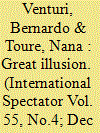

|
|
|
|
|
| Summary/Abstract |
Security sector reform (SSR) is regularly cited by states and regional organisations as crucial for stability in the Sahel. However, these declarations and interventions are not based on deep analysis, and much of the literature focuses overwhelmingly on the role of external actors or technical aspects of SSR. Against this backdrop, three preliminary factors need to be addressed in order to reform the security sectors in Burkina Faso and Mali: abuses and violations by regular armies; state support to non-state armed groups; and the securitisation of the region by external actors. In this context, SSR remains hamstrung and illusory: it is not inclusive, which threatens to undermine its outcome.
|
|
|
|
|
|
|
|
|
|
|
|
|
|
|
|
| 19 |
ID:
192609
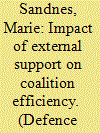

|
|
|
|
|
| Summary/Abstract |
This article examines the extent to which external actors influence the efficiency of the G5 Sahel Joint Force’s (G5S-JF) chain of command and what this means for the relationship between the G5S-JF and external actors. I argue that external actors have taken leading roles within the G5S-JF’s chain of command and that this external influence has increased the efficiency of the joint force’s command. This suggests that the relationship between the G5S-JF and external actors follows the logic of hegemonic theory, with external actors providing efficiency and stability through a strong leading voice, as other scholars have previously assumed. However, I demonstrate that there are limitations to a hegemonic understanding of this relationship, as it does not take into account the agency of the joint force. In fact, as things have developed, the hegemonic stability logic rather appears to have been proven wrong as the strong leading role of external actors was a contributing factor to Mali’s withdrawal in May 2022 and the subsequent instability of the joint force.
|
|
|
|
|
|
|
|
|
|
|
|
|
|
|
|
| 20 |
ID:
124754
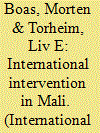

|
|
|
|
|
| Publication |
2013.
|
| Summary/Abstract |
Islamist rebels have retreated from northern Mali; however, a number of challenges for that country remain. The Islamists have gone into hiding but have not surrendered; there is a clear risk of long-term asymmetric warfare. The populations in both northern and southern Mali are divided in their views on the best way forward. The capacities of the Malian government and the Malian armed forces to contain the conflict and retain credible leadership are questionable. This article analyses the Malian crisis with an emphasis on the strategies of key actors, including the Islamist rebels. The consequences of and responses to the conflict are discussed, before the article ends with some tentative conclusions concerning the potential for security in Mali and the Sahel region.
|
|
|
|
|
|
|
|
|
|
|
|
|
|
|
|
|
|
|
|
|